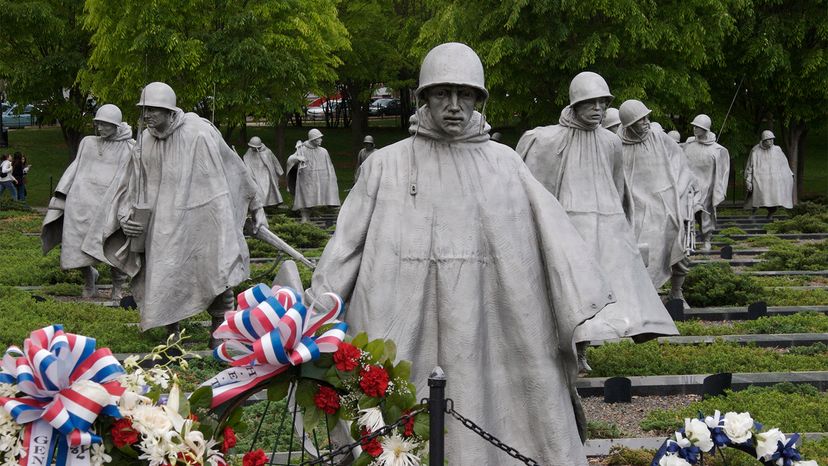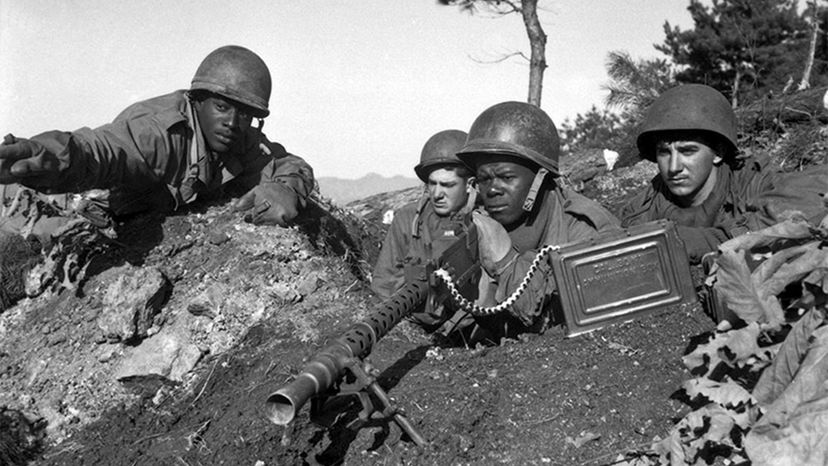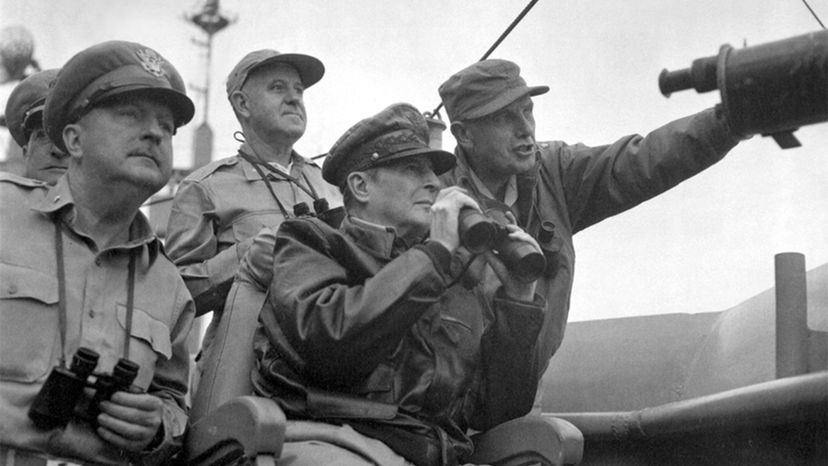What Was The Background Of The Korean War And How Did The United States Become Involved

Seventy years ago, on June 25, 1950, North Korean tanks rolled across the 38th parallel, the line that separated communist North korea from U.S.-backed South korea. Every bit a acme hush-hush U.S. intelligence cable from Tokyo to Washington concluded, the incursion wasn't just a mere raid. "The size of the North Korean Forces employed, the depth of penetration, the intensity of the attack, and the landings made miles due south of the parallel on the east declension indicated that the northward Koreans are engaged in an all-out offensive to subjugate S Korea."
The Korean War, which ultimately would pit the U.Southward. against China in the kickoff-ever confrontation between the two superpowers, would claim the lives of an estimated 2.5 million military members and civilians, including nearly 34,000 Americans. The fighting would terminate with an ceasefire on July 27, 1953, but the Geneva Conference of 1954 failed to produce a peace treaty, and the North and Due south remained tense enemies.
That's the way things pretty much have connected, though in 2018, Due north Korean dictator Kim Jong Un and Southward Korean President Moon Jae In announced that they would work together toward a peace treaty. But after the collapse of a February summit between U.S. President Donald Trump and Northward Korean dictator Kim Jong United nations, those tensions seem probable to remain for a while longer.
The "Forgotten War"
In the U.S., the Korean State of war is sometimes called the "forgotten war" because it'southward overshadowed by the conflicts that came earlier and after information technology — the stirring victory of World War II and the lengthy, painful ordeal of the Vietnam War. "Mod Americans don't remember about it much," explains Edward Rhodes, a professor on the kinesthesia of the Schar School of Policy and Authorities at George Mason University in Fairfax, Virginia, and an expert in American foreign and national security policy. "Vietnam was more traumatic, and World State of war 2 was more victorious."
Nevertheless, the disregarded conflict has exerted a powerful influence that is still felt today. Co-ordinate to Rhodes, the war forever changed the class of U.Due south. foreign and national security policy, compelling the U.S. to accept a permanent armed services involvement around the globe, even in peacetime. Information technology also helped drive the creation of a vast U.S. nuclear arsenal to deter possible communist aggression with the threat of anything, and a global nuclear artillery race that still continues.
Why Northward and South korea Split
All this happened, according to Rhodes, after Korea, a nation that had been occupied past the Japanese from 1910 to 1945, was split in two by the U.S. and the Russians after World War II. "It was a applied thing," he explains. "At that place were Japanese armies that had retreated into Korea from Manchuria, and they needed to exist disarmed. We split that big task with the Soviet Union, with the understanding that the Soviets would disarm the Japanese in the north, and we would practise it in the south." But as the Cold State of war developed between the U.S. and its European allies and the Soviets, the temporary segmentation turned into a permanent ane, with the formation of a communist government headed by Kim Il Sung in the North and an disciplinarian pro-American government headed by Syngman Rhee in the S. Each regime saw itself equally the existent government of Korea and its rival equally illegitimate, Rhodes explains.
Kim Il Sung decided to settle the matter by invading Republic of korea, and in May 1950, finally obtained reluctant approval from his patron, the Stalin government, according to this Soviet diplomatic cable. Nearly a month later, Kim launched a surprise attack, which initially had devastating results. "The Southward Korean forces just dissolved," Rhodes says.
Truman Goes to War Without Congress
The U.N. Security Council — taking reward of a Soviet cold-shoulder of the body — and so passed a measure out calling for member nations to assist the beleaguered South Koreans. That mandate enabled U.S. President Harry Truman to respond militarily without having to go to Congress for a declaration of war.
Up until that indicate, the U.S. hadn't seen South korea as having much strategic importance, Rhodes says. "Merely when the North Korean tanks rolled across the border, the image that flashed in Truman's mind was that this was a repeat of what the Nazis did," he explains. "His response is to stand up upwardly, thinking that if nosotros had stood up to Hitler early on, the world would accept been a better place."
General Douglas MacArthur in Command
An outnumbered contingent of U.N. forces formed a desperate line of defense around Pusan, the simply office of South korea not captured by the communists, and managed to concur off the invaders for two months. That gave Gen. Douglas MacArthur, who had been placed in overall command of the U.North. forces, enough fourth dimension to make an audacious amphibious landing at Inchon, near the South Korean capital of Seoul on Sept. 15, 1950, cutting off the overextended North Koreans.
MacArthur'south forces chased the invaders dorsum northward beyond the 38th parallel, and by mid-October had captured the Northward Korean capital of Pyongyang. But MacArthur, overconfident, kept pushing the North Koreans dorsum to the Yalu River, the border with China. Communist china then responded with a massive counterattack of between 130,000 and 300,000 troops. This time, it was the U.North. forces who were driven dorsum. A bloody stalemate on the ground adult, as the U.S. pounded North korea from the air. MacArthur eventually was relieved of his command by Truman and replaced with Gen. Matthew Ridgeway. The U.S. abandoned the idea of a total victory and shifted to a holding activeness against the communist forces.

U.S. Regular army
"MacArthur embraced the idea that there'south no substitute for victory," Rhodes says. "You beat the enemy, and they surrender." But afterward the Chinese intervention, "we're in a situation where there's got to be a substitute for victory, because how are we going to fight the manpower of Mainland china. At that place's a realization that we can't fight this state of war to victory, and information technology'due south hard for the American people to accept."
The longer the state of war stretched on, the more than unpopular that it became back in the U.Southward. Many of the soldiers sent to Korea were reservists who had served in Earth State of war 2. "They've got homes and families and jobs, and then they were called upwardly and sent to fight another war," Rhodes explains. "There was a feeling that this wasn't fair."
Eisenhower Ends the Fighting
Eventually, Truman'south successor, President Dwight Eisenhower, ran on a promise that he would become to Korea and seek an end to the disharmonize, and really did that a month before his inauguration in 1953, as this commodity from the Eisenhower Presidential Library explains.
But though Eisenhower had concluded the fighting, the Korean War still shaped his policies. "Eisenhower looked at this as the incorrect war at the wrong time, using the wrong weapons," Rhodes says. "He reaches the decision that with the Cold War going on with the Soviets, we have to plan for the long haul. We're going to sustain this kind of military deterrence." That led to resource existence pumped into the development of a massive nuclear deterrent that could be used to comprise the Soviets. Additionally, Eisenhower began attempting to form alliances with more than and more countries, in an endeavour to create a unified forepart to hold off communist aggression.
"The U.S. was forced to take China more seriously equally a military power after fighting to a stalemate in the Korean War," Charles K. Armstrong, the Korea Foundation Professor of Korean Studies in the Social Sciences at Columbia University, says in an email. "Gen. MacArthur [had] severely underestimated the Chinese military'southward willingness to confront the U.S. and chapters to fight, leading to a bad rout for U.Due north. forces in the initial months after Communist china entered the war."
China'due south participation in the Korean War as well consolidated Mao's dominion and dashed the hopes of some Americans the communist regime could be "rolled back" and replaced by Chiang Kai-shek's Nationalists, Armstrong says.
"Mao'south willingness to support the North Koreans direct, as opposed to Stalin's reluctance, helped to solidify China-Northward Korean relations and cause the North Koreans to be more than distrustful of the Russians," Armstrong says. "For the U.S., China was seen from the Korean State of war onward every bit the main ally of North korea and the primary not bad power that was an enemy of the U.S. in Korea."
Korean State of war Gear up the Table for Vietnam
The armistice ended the fighting, but North Korea, now backed by the Chinese, remained as a belligerent enemy to Republic of korea. That ongoing threat meant that U.S. forces couldn't merely withdraw and come home. "The North Korean invasion in the emerging Common cold War convinced American policy-makers that the U.S. needed a permanent war machine presence in Asia and Europe in guild to incorporate communist aggression," Armstrong notes.
Additionally, the Korean War helped set the tabular array for another, fifty-fifty bloodier and more than painful future conflict. According to Armstrong, Korea led directly to the U.South. determination to aid the French against communist-led insurgency in colonial Vietnam, and and so, later on the French defeat, to intervene in back up of an anti-communist regime in South Vietnam, which blocked an election called for past the 1954 Geneva Conference. That helped fix the phase for the Vietnam State of war.

Nutter/CCO Public Domain
A Lasting Legacy
"The nigh lasting legacy of the Korean State of war for the U.S., was the establishment of a global military machine presence over the long term, and a commitment to confront communism throughout the globe during the Cold War, and for Korea and Eastward Asia, ideological and military confrontation that has lasted seven decades," according to Armstrong.
That's included a U.S. force stationed in Republic of korea as a deterrent to Due north Korea, which in plough has a massive array of long-range arms and rockets equipped with chemic and biological weapons aimed at Seoul, according to this recent commodity from the Quango on Foreign Relations. That's in improver to the nuclear weapons and ballistic missile arsenal that Trump so far has been unable to persuade the North Korean government to give up.
Learn more virtually the Korean War in " The Coldest War " by James Brady. HowStuffWorks picks related titles based on books we think you'll like. Should you cull to buy one, we'll receive a portion of the auction.
Originally Published: May ane, 2019
What Was The Background Of The Korean War And How Did The United States Become Involved,
Source: https://history.howstuffworks.com/historical-events/korean-war.htm
Posted by: sheppardanstor47.blogspot.com


0 Response to "What Was The Background Of The Korean War And How Did The United States Become Involved"
Post a Comment